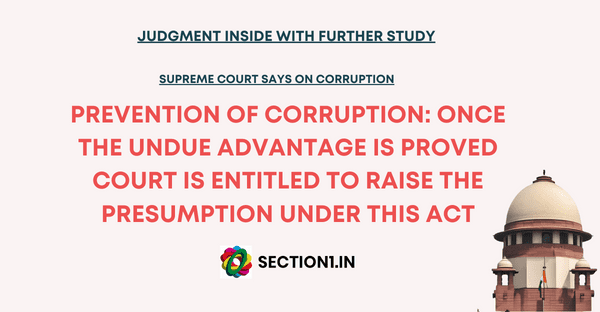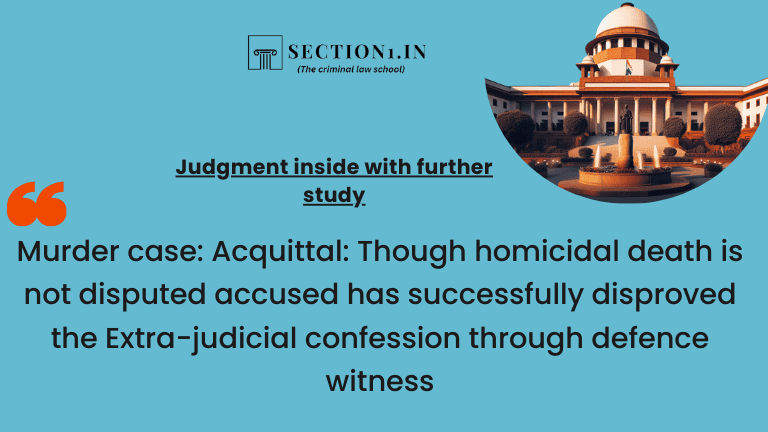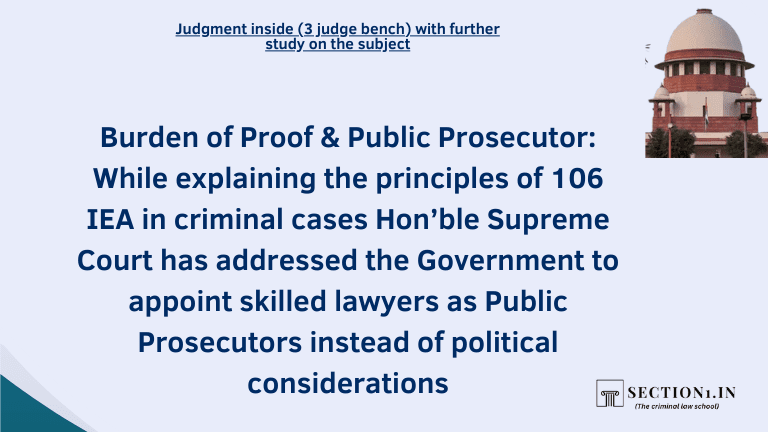Appeal
1. The original appellant P. Sarangapani son of Laxmaiah (accused no.1) having expired pending the present Appeal, his wife Paka Saroja was permitted to proceed further with the Appeal as per the order passed by the court on 31st August, 2023.
Appeal reason
The instant Appeal is directed against the judgment and order dated 21st March, 2011 passed by the High Court of Andhra Pradesh at Hyderabad in Criminal Appeal No.54 of 2005, whereby the High Court had dismissed the Appeal filed by the appellant-accused no.1 and confirmed the judgment and order dated 06.01.2005 passed by the Principal Special Judge for SPE and ACB Cases-cum-IV Additional Chief Judge City Civil Court Hyderabad (hereinafter referred to as the Trial Court) in CC No.08 of 1994. The Trial Court had convicted the appellant accused no.1 P.Sarangapani for the offences under Section 7 and Section 13(1)(d)r/w 13(2) of the Prevention of Corruption Act, 1988 (for short, the PC Act) and sentenced him to imprisonment for one year and pay a fine of Rs.1,000/- in default, to suffer Simple Imprisonment for three months for the offence under Section 7 and to suffer Rigorous Imprisonment for two years and pay a fine of Rs.2,000/- in default, to suffer Simple Imprisonment for six months for the offence under Section 13(1)(d)r/w 13(2) of the P.C. Act.
Defacto-Complainant and Co-Accused died before trial starts
3. The chargesheet for the alleged offences was laid by the Investigating Officer, Deputy Superintendent of Police Shri P.L. Raju, Anti-Corruption Bureau, Warangal Range, Warangal against the appellant accused no.1 P.Sarangapani and one another accused P.Vasudev son of Mallaiah. The said accused P.Vasudev having expired pending trial, the appellant accused alone was tried by the Trial Court. The defacto-complainant Sri Immadi Laxmaiah also had expired prior to commencement of the trial and therefore he could not be examined by the prosecution.
Case of the prosecution
4. The case of prosecution in nutshell was that the appellant accused Sri Sarangapani while discharging his duty as the Sub Registrar, Cooperative Societies had demanded and accepted a sum of Rs.1500/- as gratification other then legal remuneration from the defacto-complainant Sri Immadi Laxmaiah on 27.03.1993, for himself and for the accused no.2 P.Vasudev, the Deputy Registrar Cooperative Societies in the office of Divisional Cooperative Khammam, as a motive or reward for showing an official favour, in allowing the complainant to continue as the President of the Society, and thereby both the accused had committed the offence under Section 7 and Section 13(1)(d)r/w 13(2) of the PC Act.
xxx
Section 313 Cr.P.C and statement of the accused
6. On the closure of prosecution evidence, the appellant-accused P.Sarangapani was examined under Section 313 of Cr.P.C, wherein he had denied the allegations levelled against him and had stated that he was falsely implicated. He also had filed a written statement contending inter alia that he never demanded and accepted any illegal gratification from the complainant as alleged. The appellant accused had also examined DW-1 Sri K. Venkateshwarlu, resident of Chintakani Mandal of Khammam District, to substantiate his defence.
Sentenced by trial court and confirmed by the appellate court
7. The Trial Court after appreciating the oral as well as the documentary evidence adduced by the prosecution, held that the prosecution had proved the charges levelled against the appellant/ accused beyond reasonable doubt. Accordingly, the appellant was convicted and sentenced as stated hereinabove. In the Appeal preferred by the appellant before the High Court, against the said judgment of conviction and sentence, the High Court reappreciated the evidence on record and confirmed the conviction and sentence recorded by the Trial Court.
xxx
The counsel for the appellant has argued that in the instant case, the complainant having expired before the commencement of trial, could not be examined and hence the very allegation of demand of money as bribe was not proved by the prosecution. Counsel for the appellant further argued quoting s.164 Cr.P.C that complainant himself had stated therein that he had paid the amount to the accused towards the Audit fees of the society and that the accused was falsely implicated by the former President of the society Pulla Reddy, who had a grudge against the accused. He further argued that the presumption u/s 20 of the P.C Act could not be drawn against the appellant. He also placed reliance on B. Jayaraj v. State of Andhra Pradesh – (2014) 13 SCC 55.
Apex Court’s view on the aforesaid argument
9. In our opinion, there is no substance in any of the submissions made by the learned counsel for the appellant. It is well settled proposition of law that the death of the complainant or nonavailability of the complainant at the time of trial could not be said to be fatal to the case of prosecution, nor could it be said to be a ground to acquit the accused. It is always open for the prosecution to prove the contents of the complaint and other facts in issue by leading other oral or documentary evidence, in case of death of or nonavailability of the complainant. Recently, the Constitution Bench in case of Neeraj Dutta vs. State (Government of NCT of Delhi), has held that: –
“88.6. (f) In the event the complainant turns “hostile”, or has died or is unavailable to let in his evidence during trial, demand of illegal gratification can be proved by letting in the evidence of any other witness who can again let in evidence, either orally or by documentary evidence or the prosecution can prove the case by circumstantial evidence. The trial does not abate nor does it result in an order of acquittal of the accused public servant.”
Accused accepted in his s.313 statement that he has received alleged amount
10. In the instant case the appellant/ accused in his explanation under Section 313 had accepted the receipt of alleged amount. The court therefore was required to appreciate the evidence laid by the prosecution in the light of the said explanation and to consider as to whether the said amount was an illegal gratification other than the legal remuneration or not. It cannot be gainsaid that if the accused offers reasonable and probable explanation based on the evidence that the money was accepted by him other than as illegal gratification, the benefit of doubt should be granted to the accused. It is also true that the accused is not required to establish his defence beyond reasonable doubt as the prosecution, and can establish the same on the preponderance of probability. However, the court cannot be oblivious to the statutory presumption permissible to be raised under Section 20 of PC Act with regard to the motive of the accused. Section 20 reads as under: –
Once the undue advantage if proved court is entitled to raise the presumption under this act
11. In view of the above, once the undue advantage i.e., any gratification whatever, other than the legal remuneration is proved to have been accepted by the accused, the Court is entitled to raise the presumption under Section 20 that he accepted the undue advantage as a motive or reward under Section 7 for performing or to cause performance of a public 10 duty improperly or dishonestly. No doubt, such presumption is rebuttable. The Constitution Bench in Neeraj Dutta (supra), also had dealt with the issue of presumption under Section 20 of the Act and held as under:
“88.7. (g) Insofar as Section 7 of the Act is concerned, on the proof of the facts in issue, Section 20 mandates the court to raise a presumption that the illegal gratification was for the purpose of a motive or reward as mentioned in the said Section. The said presumption has to be raised by the court as a legal presumption or a presumption in law. Of course, the said presumption is also subject to rebuttal. Section 20 does not apply to Sections 13(1)(d)(i) and (ii) of the Act.”
Accused explanation (defence taken) did not tally with the statement of the complainant’s 164 cr.p.c statement
12. In the instant case the pre-trap and post-trap proceedings were duly proved by the prosecution by examining the concerned witnesses, who had duly supported the case of prosecution. Both the courts below have recorded the findings that the prosecution had proved beyond reasonable doubt the conscious acceptance of the tainted currency by the accused and also the recovery of tainted currency from the appellant. Therefore, the burden had shifted on the appellant to dispel the statutory presumption under Section 20 of the said Act, and prove that it was not accepted as a motive or reward for the performance of his public duty, which the appellant had failed to dispel. The explanation offered by the appellant did not tally with the statement of the complainant recorded under Section 164 of Cr.P.C. The High Court had also recorded that the defence taken by the appellant that the acceptance of tainted currency by him was towards the Audit fees of the Society was not proved by him in as much as there was nothing on record to show that the amount paid by the complainant Immadi Laxmaiah to the appellant was out of the funds of the Society.
Party
P. SARANGAPANI (DEAD) THROUGH LR PAKA SAROJA …APPELLANT(S) VERSUS STATE OF ANDHRA PRADESH …RESPONDENT(S) – CRIMINAL APPEAL NO.2173 OF 2011 – September 21st, 2023 – 2023 INSC 844.
click here to go to direct link
p. sarangapani (dead) vs. State of A.P
Further study on the subject
Whether the relatives of the accused may prefer appeal even after the death of the accused?
An amendment to S. 431 Cr.P.C (old code) was suggested in the Bill introduced in the Parliament by a private member, Shri.K.V.Raghunatha Reddy. The main object of the amendment was to provide machinery whereby the children or the members of the family of a convicted person who dies during the appeal could challenge the conviction and get rid of the odium attaching to the family as a result of the conviction. The Law Commission of India by its Forty – Fourth (44th)Report found the proposed amendment ‘eminently sound’ and recommended that the amendment be made with certain modifications. Accordingly S. 394 Cr.P.C has made the said proviso. It is thus clear that every appeal under Chapter XXIX of the Code except an appeal from a sentence of fine shall finally abate on the death of the appellant but a near relative of the deceased appellant may, within thirty days of the death of the appellant, apply to the Appellate Court for leave to continue the appeal; and if leave is granted, the appeal shall not abate. It is thus clear that no near relative of the deceased appellant is automatically entitled to come on record as a legal representative of the deceased appellant and continue the appeal unless leave is granted by the appellate court to continue the appeal. Once the leave is granted by the appellate court, the appeal shall not abate. [Jugal Kishore Khetawat vs. State of W.B – CRIMINAL APPEAL NO. 168 OF 2007 – February 25, 2011].
- SECTION 139 N.I ACT – REBUTTABLE PRESUMPTION – EXPLAINED.
- HOW TO PROVE SECTION 7 P.C ACT? – EXPLAINED
- WHAT IS PRESUMPTION U/S 20 OF P.C ACT?
- PROTEST PETITION – EVEN IN A CASE WHERE THE FINAL REPORT OF THE POLICE UNDER SECTION 173 IS ACCEPTED AND THE ACCUSED PERSONS ARE DISCHARGED, THE MAGISTRATE HAS THE POWER TO TAKE COGNIZANCE OF THE OFFENCE ON A COMPLAINT OR A PROTEST PETITION ON THE SAME OR SIMILAR ALLEGATIONS
- Discharge: Discharge application cannot be filed after the trial starts






